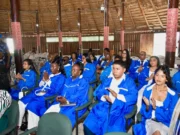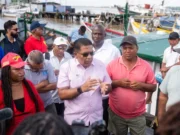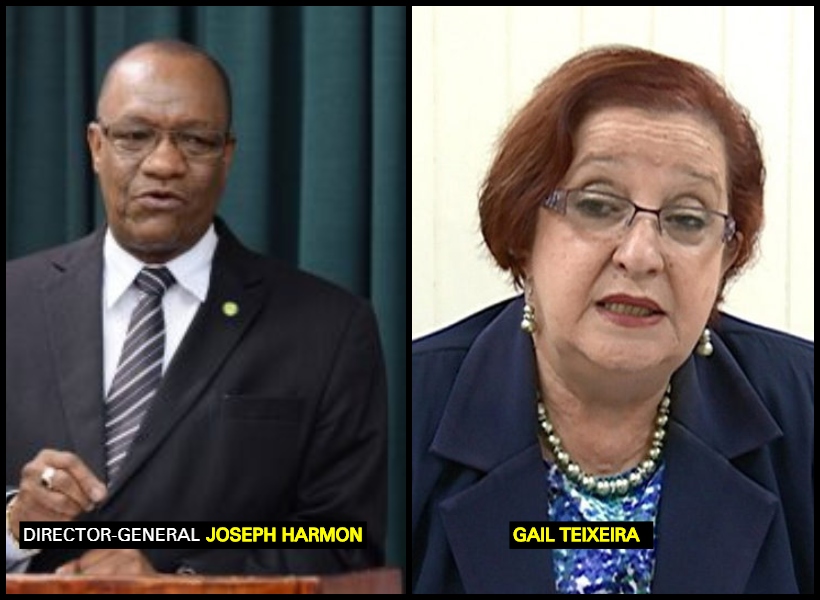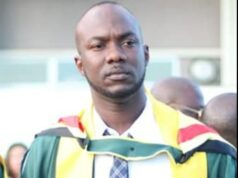The People’s Progressive Party (PPP) today wrote Director-General Joseph Harmon seeking clarification on some nitty-gritty issues arising out of engagements between representatives of the President and Opposition Leader yesterday. That meeting was one to hammer out the names of persons that can be found acceptable by both President David Granger and Opposition Leader Bharrat Jagdeo to be appointed Chairman of Guyana Elections Commission (GECOM).
The PPP asked Harmon to clarify at least three points and gave him up until noon tomorrow (July 11) to provide a response.
Further, PPP indicated that if certain things are to be done in an undesirable manner, it will opt to revert to the constitutional process of the Opposition Leader meeting with the President as opposed to the method of a Joint Working Group currently being employed.
PPP’s Gail Teixeira wrote that following the second meeting yesterday between the representatives, “There are a number of issues that are unclear and of which we now seek clarifications.”
The first issue noted by Teixeira was that, at the meeting, PPP reps were informed that four of the names on the list of 11 nominees — “appropriately adjusted from the original 18 names of 2017” — submitted by the Leader of the Opposition to the President on July 5th, 2019 for consideration for the appointment of GECOM Chairman were given labels like: “no objection”, “tending towards acceptability” and “shortlisted”.
Teixeira said, “You would recall that our specific enquiry of whether these four names are ‘not unacceptable’ to the President was answered in the negative. In the circumstances, we now enquire of the meaning and purport of the terms ‘no objection’, ‘tending towards acceptability’ and ‘shortlisted’.
“We further and specifically enquire, hereof, whether these names are “not unacceptable” to the President.”
The second issue is “We were also informed that another two of the names submitted were singled out as being pending/under active consideration. In the circumstances, we now enquire of the meaning and purport of these terminologies; before whom are these names pending, under whose consideration are they active, the President or his Representatives and are these names ‘not unacceptable’ to the President?”
The third issue outlined by PPP is that while five of the names submitted were rejected with reasons proffered, it remains unclear if the decision to reject these names and the reasons proffered was made by President Granger or his representatives.
PPP told Harmon, “For the avoidance of doubt, we reiterate our commitment and availability to meet at any time, in order to advance and expeditiously conclude this process. We express our disappointment that the president’s representatives were unable to meet today, Wednesday the 10th July 2019, to continue the engagement.”
PPP was clear, however, that if the views expressed at the meetings are those of the president’s representatives and not of the President, and therefore, names “hammered out” at these engagements are still required to obtain the acceptability of the President, “then these engagements would have been, largely, futile, if not, perfunctory.”
The party said, “We agreed to this engagement to effectuate the ‘good faith’ admonitions enunciated by the Caribbean Court of Justice (CCJ), which must preponderate engagements between the President and the Leader of the Opposition. We, therefore, expect that the president’s representatives will be duly authorised to make commitments at these engagements in their capacity as conduits of the President. Unfortunately, these engagements, thus far, have failed these expectations, hence, our enquiries above.”
Further, PPP informed Harmon that the letter and any response will be disclosed to the Caribbean Court of Justice (CCJ) before July 12, 2019, when the court is expected to give consequential orders. “…So we shall appreciate a response by tomorrow 11th July 2019, at 12 noon, and may determine whether this engagement will continue or whether, we will revert to the Leader of the Opposition and the President engaging, personally, as mandated by Article 161 (2) of the Constitution.”













